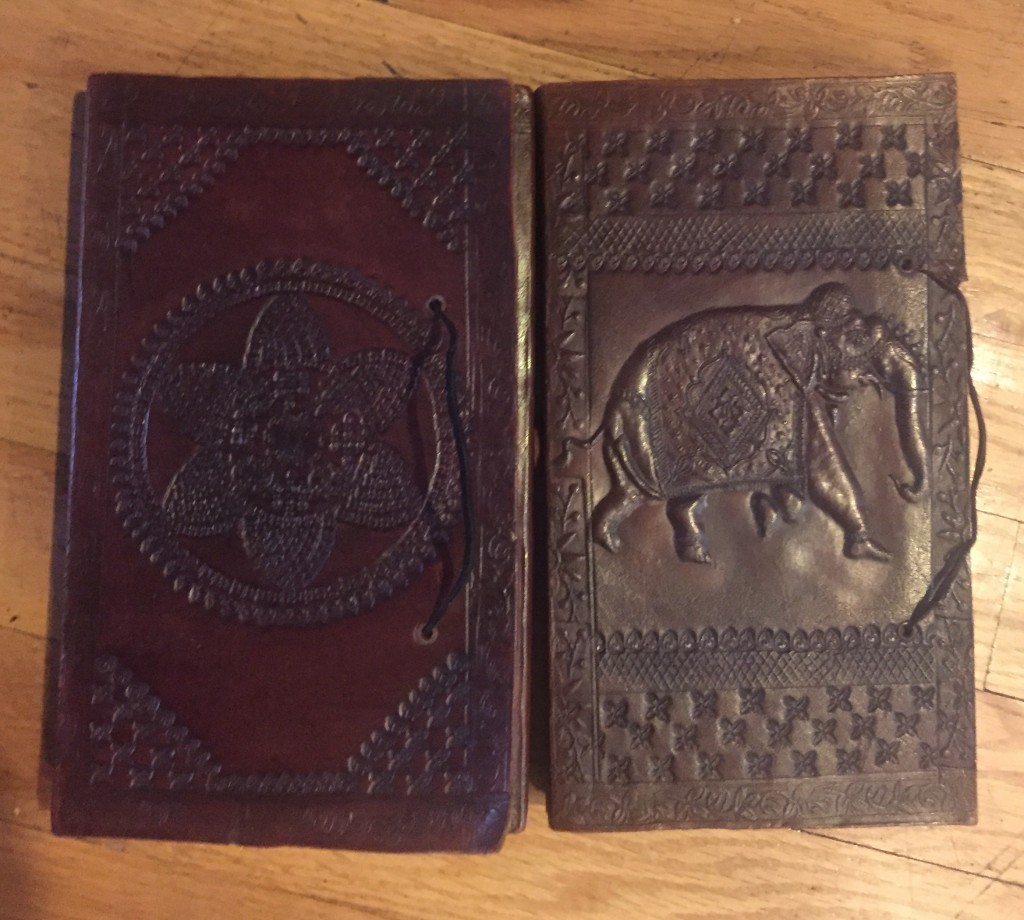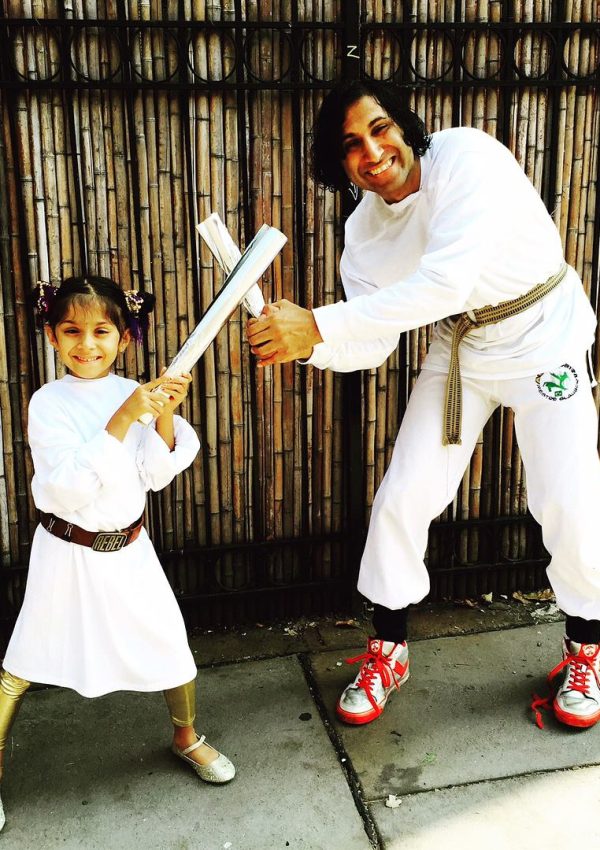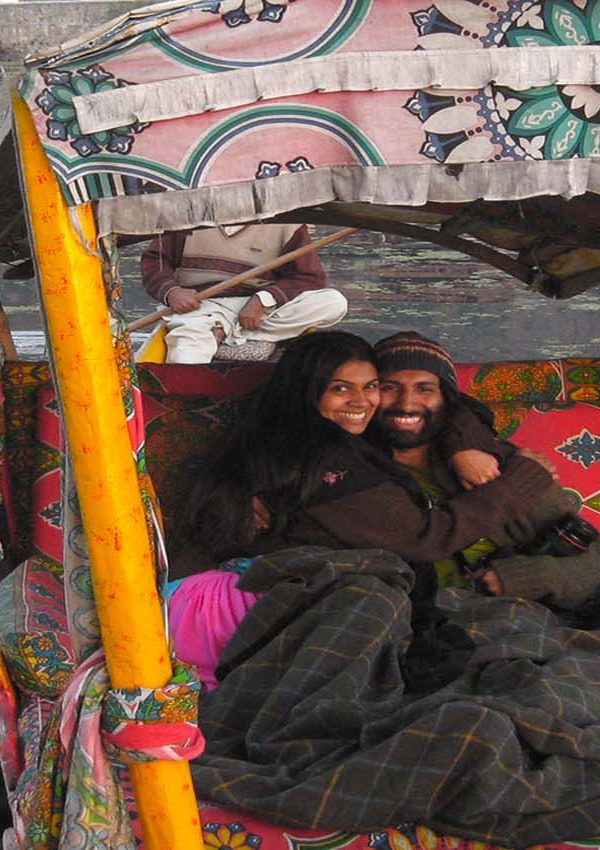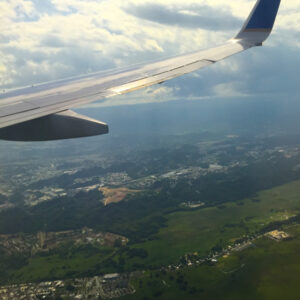
On my first solo backpacking trip through Asia in the days before digital cameras, iphones, Facebook, or twitter, every traveler I met carried around a writing journal and at least one book. Wherever I went, I would buy up journals in case I was on a train or somewhere I couldn’t find more, and stock up on travel books like a maniac. My backpack became laden with these books and journals. I couldn’t resist buying them. Or parting with them. One journal I especially like I found in Udaipur on a walk about. It took me a while to write in it because it was so nice. I remember being at guesthouses or dosa huts or dhabas or anywhere in backpacker enclaves in places like Thamel or Varanasi or Lhasa or Hanoi and seeing lots of travelers just sitting around reading actual books or writing in their journals. It was fantastic and there’s nothing like that sense of immediate camaraderie with someone than sitting in silence and reading a book or writing in a journal, looking up and seeing other people doing the same thing. No audience to think about or top ten lists. Just writing or reading because it means something. And when we’d talk about books we were reading, the energy would pour over. If we connected as people, we trusted the recommendations. I have several books given to me by fellow travelers that I’ve never ever seen anywhere again, even on amazon.
When me and Sona went backpacking to India for six months, we double downed on the book addiction, and spent $1000 for the excess baggage fee just to lug them all back home where they now sit crammed onto the bookshelf, on the floor, and in boxes. Basically, all over the place in a book explosion. It still pains me to think of the amount of gol guppe, masala dosa, rogan josh, other delicious street food, or long distance train trips we could have bought with that money.
I’ve often thought about why we didn’t just leave some of the books there, a mix of fiction, politics, comics, and lots of travel memoirs. Most of them were under a few dollars (we bought a lot of them). But it’s something I’ve never really thought about hard or long enough to articulate. Or perhaps I just didn’t want to say it out loud. It’s the diverse voices, the way India is treated like it’s a real place with traditions and history that aren’t just there for white people to be transformed by. That these books exist. That might not seem worth the steep price or the hassle of carrying it all over India and on trains, but to me it was worth it.
Travel workshops and graduate seminars on travel writing, and booklists and syllabi all make it clear that white people created this genre. They defined dystopia, utopia, the first science fiction novel was written by a white man, and naturally the travel narrative is filled with white males. Paul Theroux. Rudyard Kipling. Bill Bryson. Mark Twain. Marco Polo. Jack Kerouac. Peter Hessler. You want books about love, passion, loneliness, on understanding a region – anywhere in Africa, Asia, we have lists filled with white people to tell you about it. Diversity begins and ends with white female travel writing going back maybe ten years, and Pico Iyer. I thoroughly enjoy these books, with their stunning writing and often very funny descriptions of a place. But it is mind numbing when these are the only options. I like rice. But I don’t like it everyday for every meal, or without any accompaniment. That’s how we’re being fed white writing that my immediate reaction whenever I hear of another travel narrative about someone quitting their corporate job to go find themselves is, “fucking rice again.”
A lack of diversity and a mythologized whitewashed history of the travel genre makes for an incredibly boring literary landscape that presents a distorted view of the world for everyone. Which is why the idea that you can be black and French or American and not white blows people’s minds. Indian science fiction is not a new thing reflecting Western values, and travel writing from all over Africa is not some new thing either. Travel blogging isn’t represented as a white club because POC aren’t out there. It’s because our voices are being silenced. A lot of POC don’t enter into this conversation because it’s way too exhausting having to defend your existence and most POC don’t want to be accused of being obsessed with race. I don’t have that problem. Besides, we’re not the ones who are obsessed with it.
After I wrote a post about the stark whiteness in the travel blogging industry, I was asked to be a panelist on a much needed discussion on diversity in travel writing on Outbounding.com and things got heated very quickly. It was a good reminder that some of the strongest opposition often comes from other People of Colour. Many of the comments were thoughtful and along the lines of, what can we do.
But there were some comments in the discussion as well as things people have said to me over the years that echo the same tired arguments: POC just aren’t writing travel memoirs. Travel writing as a genre is inherently white.
I say, bullshit to that. And I know many people who would like to as well, but don’t have books they can name as a counter. Google “Best travel books,” or something similar and you will find very few People of Color even mentioned. Pico Iyer perhaps. But not Mungo Park or Ibn Batuta. Not even major names like Salman Rushdie, Zora Neale Hurston, Madhur Jaffrey, or Maya Angelou. MAYA ANGELOU.
I’ve written this list to help diversify travel blog reading to include these Ten Awesome Narrative Travel Bloggers of Color To Read in 2015, but travel memoirs by People of Colour are much more established going all the way back to the 13th century (and before if you want to be super nerdy).
Starting next week with one of my favourite connections in travel memoirs: novelists who write about travel! I’ll update the links here and won’t be redundant by using books from this great starter list by my friend, fellow traveler, and VONA alum, Bani Amor: Ten Travel Books by People of Color







Dude there are so many “overhwelming whiteness” food metaphors going around right now – Saltines, Kraft mayo, Wonderbread – and now white rice. It actually reminds me of a fellow student’s work in a travel writing workshop I took once; she called her piece White on Rice and it was like Lost in Translation but in Uganda. All of the white feelings of otherness at being called mzungu. Also, please write a list of travel memoir by poc puhleeease.
White food metaphors, the listicle. Get on it, girl. Or you know we will. That travel piece you mentioned sounds spectacular. Your wish is our command, Bani =) http://www.ishqinabackpack.com/10-travel-memoirs-by-novelists-of-color/
True article! The experiences according to one’s demographic are unique..it’s not a one size fits all as books written for us would want us to believe. I reckon as well that more people of colour should get out there and write about heir experiences because the world is largely ignorant about people of colour because they don’t get to hear our voices more.